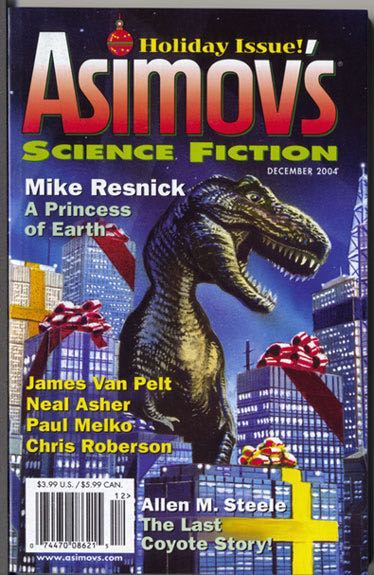Asimov's Science Fiction, December 2004
143 pages
I rarely release to the public my reviews of magazines, but the December issue of Asimov's Science Fiction has a column by James Patrick Kelly that merits discussion. Kelly examines Ebooks to determine if they will fundamentally change the publishing industry. If it seems premature to talk about the end of books-as-we-know-them, consider that even ten years ago no one knew that MP3s and the Internet would threaten the music industry.
There are problems with Ebooks.
- They require a reading device--a computer or a PDA or a specialty Ebook reader
- The ease of unauthorized duplicating scares publishing companies to death
- Onerous licenses and digital rights management schemes aggravate users
Despite those problems, Kelly points to Cory Doctorow's statement that "More people are reading more words off more screens every day, [and] fewer people are reading fewer words of fewer pages every day." Ebooks are a niche market today, but this is a niche market that can only get bigger.
It seems clear to me that Ebooks will flourish as a complement to traditional paper books, just as CDs continue to sell by the hundreds of millions even as MP3s are becoming ubiquitous. I like to own physical books just as I like to own physical CDs. Today I never use my CDs, choosing instead to convert them to MP3s for use on the computer. Perhaps in the near future I shall purchase paper books and then download a digital copy for reading.
Of course, for Ebooks to catch on there must be an attractive feature. That feature is full text search. Consider this scenario that happens to me at least once a week: I'm reading a novel. Something in the text catches my attention and makes me wonder about something the author said earlier. So I need to find and re-read a key section of the book. I reach out to hit Ctrl+F to bring up the Find dialog and realize--to my chagrin--that I'm reading a paper book. There is no search feature.
At that point I either spend ten minutes flipping through pages to find the passage I want or I go online and see if I can find a bootleg copy of the book text so I can do a search.
I cannot say whether Ebooks will change the publishing world. Perhaps they will, perhaps not. The best we can do is consider the current changes in the music and movie industries and then try to project how Ebook technology will affect books. I anticpate that within 20 years there will be noticeable changes in the publishing industry, but I do not know as yet what those changes will be.
- Novelette: Strength Alone, by Paul Melko - Enhanced people live together as single-consciousness pods. When one man gets separated from his pod during an avalanche, he must act as a singleton to save the shocked members of another broken pod.
- Novelette: Home of the Brave, by Allen M. Steele - Part of the Coyote series. A fitting ending to an interesting story.
- Novelette: A Reunion, by Keith Ferrell - The closure of the gatestation cuts a frontier planet off from any help. Without technology they learn to cope by doing manual labor and creating things themselves. When the gatestation is reopened it is a joyous day for the adults, but it is one of mourning for one child who grew up without the machines.
- The Christmas Tree, by Peter Friend - A Christmas tree is a carnivorous creature that lures prey with its lovely smells.
- The Star Called Wormwood, by Elizabeth Counihan - End of humanity.
- A Princess of Earth, by Mike Resnick - A widower meets John Carter.
- Being with Jimmy, by Aaron Schutz - An abused telepathic boy is exiled to an isolated island.
- Red Hands, Black Hands, by Chris Roberson - A writer on a Chinese colony world stirs up trouble with her revolutionary ideas.
- Strood, by Neal Asher - Aliens come to Earth and offer nearly unlimited help and assistence--but is there a sinister reason behind all this?
- Echoing, by James Van Pelt - Truck driver in snowstorm becomes ship caption in deep space becomes suicidal girl in office.
